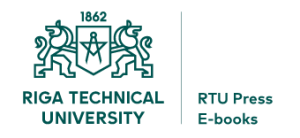Architectural Competitions in Latvia
Summary of the Doctoral Thesis
Linda Leitāne, Riga Technical University, Latvia
![]() http://orcid.org/0000-0001-5442-3680
http://orcid.org/0000-0001-5442-3680
Competition, as a comparison of skills, talents and mastery by striving to surpass others and achieve better results, exists in all fields. In architecture, one of the forms of such contest is the practice of competitions. The role of architecture competitions as a democratic tool of design gains increasing significance in the everyday practice of professional architects. The complicated history of the Republic of Latvia with its various periods of political regimes and economic development has influenced the complex procedure of the organising of competitions. In the context of Latvian architecture history, competitions are a part of the theory of architecture and the common intellectual heritage, which is an important indicator of social and economic processes, as well as a policy instrument. A sizeable database on architecture competition practice in Latvia from the middle of the 19thcentury to the second decade of the 21stcentury has been created with a chronological and typological view, compiling competition types, stakeholders and results, as well as objects constructed based on competition projects. Over 1080 competition projects have been researched in total. Competition practice-related risks that justify or delay the realisation of competition projects have been identified. Consequences have been identified that are related to: 1) the achievement of defined goals, preparation of the brief and program and their contents in Latvian architecture competitions; 2) evaluation criteria for the proposals and the decisions of evaluators; 3) professionalism of evaluators; 4) requirements for the participants, incl. the selection of a competent cooperation partner; 5) reasons for disqualification; 6) regulation of anonymity and copyrights of participants and observation of this regulation; 7) submission deadlines of the proposals; 8) costs of competitions, incl. the amount of prizes, the cost price for the participants, the fiscal situation of clients and their ability to attract funding; 9) publicity of competitions and the dialogue with the general public; 10) the impact of competitions. Regularities in the development of architecture competition regulation practice have been determined, and terms used in competition practice have been explained. The scientific research of Latvian architecture competition practice offers new factual material and theoretical insights. The research can serve as the basis for the creation of general education materials for field professionals and any interested persons involved in the general process of architecture promotion. The results of the work have already been used in publications available to the broader society. Through their work at the Latvian Association of Architects, the author has directly promoted and developed the guidelines for architecture competition practice outlined in the PhD thesis.
Additional information
| DOI | |
|---|---|
| Publication type | |
| Hyperlink | |
| Defence date | 27.06.2019. |
| ISBN (print) | 978-9934-22-315-0 |
| ISBN (pdf) | 978-9934-22-316-7 |
| Format | |
| Pages | 93 |
| Published online | |
| Publisher | RTU Press |
| Country of Publication | Latvia |
| Publication language |
You must be logged in to post a review.




Reviews
There are no reviews yet.